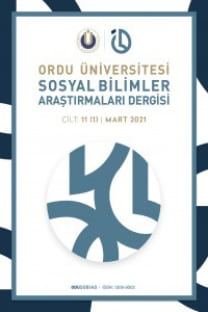Pişmanlığın Karanlık ve Aydınlık Yüzü: Yöneticilik Tecrübesi Odağında Nitel Bir Araştırma
Bu çalışmanın amacı, pişmanlık deneyimine sebep olabilecek etkenler ile söz konusu deneyimin sonucu gelişebilecek olumlu ve olumsuz tutumları, yöneticilik tecrübesi bulunan bireyler üzerinden açıklamaya çalışmaktır. Nitel yöntem kapsamındaki olgubilim deseninin tercih edildiği araştırmada veriler, yapılandırılmış görüşme (N=29) ve odak grup görüşmesi (N=5) teknikleri kullanılarak farklı il ve sektörlerde yöneticilik tecrübesi bulunan toplamda 34 katılımcıdan elde edilmiştir. Betimsel analiz ve içerik analizi uygulanan araştırmada geçerlilik ve güvenilirlik için gereken ölçütler sağlanmıştır. Analiz sonuçlarında, işe karşı olumsuz tutum yaratan pişmanlıklar 5 tema 19 kod; olumlu tutum yaratan pişmanlıklar ise 3 tema ve 11 kod ile temsil edilmiştir. Ulaşılan bulgular yazın ışığında tartışılmış, gelecek araştırmalar için öneriler geliştirilmiştir.
Anahtar Kelimeler:
Pişmanlık, Yöneticilik Tecrübesi, Nitel Yöntem, İçerik Analizi, Betimsel Analiz
Dark and Light Side of Regret: A Qualitative Research Focusing on Management Experience
The aim of this study is to try to explain the factors that can cause the regret experience and the positive and negative attitudes that may develop as a result of the regret experience. This aim has been tried to be achieved through the data obtained from individuals with managerial experience. In the research, the phenomenology design within the scope of the qualitative method was preferred. Data were obtained using structured interview (N=29) and focus group interview (N=5) techniques. Participants consist of 34 people with managerial experience in different provinces and sectors. In the research, descriptive analysis and content analysis were applied, and the necessary criteria for validity and reliability were provided. As a result of the analysis, regrets that create negative attitudes towards work were represented by 5 themes and 19 codes and regrets creating apositive attitude were represented by 3 themes and 11 codes. The findings were discussed within the scope of literature, and suggestions were developed for future research.
Keywords:
Regret, Management Experience, Qualitative Method, Content Analysis, Descriptive Analysis,
___
- Bagger, J., Reb, J. ve Li, A. (2014). Anticipated regret in time-based work-family conflict. Journal of Managerial Psychology, 29(4), 304-320.
- Bell, D. E. (1982). Regret in decision making under uncertainty. Operations Research, 30(5), 961–981.
- Buchanan, J., Summerville, A., Reb, J. ve Lehmann, J. (2016). The Regret Elements Scale: Distinguishing the affective and cognitive components of regret. Judgment and Decision Making, 11(3), 275-286.
- ISSN: 1309-9302
- Yayın Aralığı: Yılda 3 Sayı
- Başlangıç: 2010
- Yayıncı: -
Sayıdaki Diğer Makaleler
Türkiye’de Cumhuriyet Sonrası Çıkan Çocuk Dergi Kapak Tasarımlarının Görsel Analizi
Miray BEŞBUDAK, Neslihan ÖZMELEK TAŞ, Azra K. NAZLI
Bektaşi Tarikatına Ait Bir Halifelik Tıraş Erkânnâmesi: “Menzil-i Hilâfet Tıraş-ı Erkân”
Çağdaş Tiyatroda Maskenin Yeniden Keşfi: Artaud’dan Lecoq’a
Göçmen Öğrencilerin Uyumlarında Temasın Rolü
Gösterişçi Tüketim Davranışı Ekseninde Yeni Orta Sınıfların Tüketim Pratikleri
